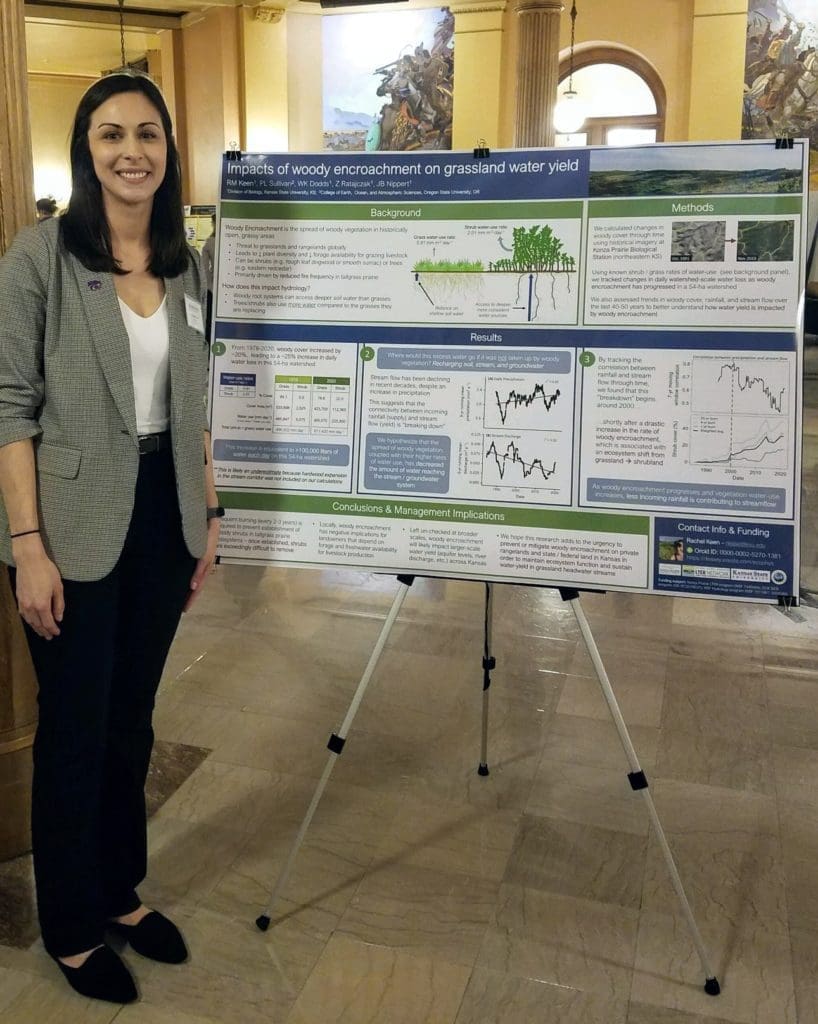MANHATTAN — Two Kansas State University graduate students received statewide recognition for their Kansas-related research at the 20th Capitol Graduate Research Summit on March 22 at the State Capitol in Topeka.
Rachel Keen, doctoral student in biology, Manhattan, and Endy Kailer, doctoral student in agronomy, Brazil, were the two K-State winners at the Capitol Graduate Research Summit, or CGRS. They each received a $500 scholarship.
The Capitol Graduate Research Summit is a statewide event that features the current research of graduate students at Kansas State University, the University of Kansas, the University of Kansas Medical Center, Wichita State University, Fort Hays State University, Emporia State University and Pittsburgh State University. Judges selected the most outstanding presentations from each university to receive awards.
Keen presented “Impacts of woody encroachment on grassland water yield.” Her faculty adviser is Jesse Nippert, professor of biology.
Keen’s research addresses how the spread of shrubs and trees in grasslands, or woody encroachment, impacts water supply in the tallgrass prairies of northeastern Kansas. Woody plants typically use more water than the grasses they replace. As a result, woody encroachment reduces the amount of water available to recharge groundwater and contribute to stream flow, ultimately having a negative impact on water yield in tallgrass prairies. Keen’s research suggests that regular prescribed burning can prevent woody plants from establishing and spreading, minimizing the negative impacts on water yield.
“It was a lot of fun to attend the CGRS and hear about the research being performed by other graduate students at K-State and at universities across Kansas,” said Keen. “It was a very diverse group of presenters and topics. It’s important for us as researchers to communicate the results of our work to non-science audiences and policy-makers, and this was a great opportunity to do that in a very supportive environment.”
Kailer presented “The complex relationship between native mycorrhizal community and phosphorus addition in commercial mycorrhizal inoculant effectiveness.” Her faculty adviser is Charles Rice, university distinguished professor of agronomy.
Kailer’s research focuses on the benefits of arbuscular mycorrhizal fungi, or AMF, for sustainable agriculture and environmental conservation. Her studies have revealed a strong presence of native AMF in soils from Kansas, and she is actively working on bringing these communities back to agricultural soils so farmers can benefit from their ecosystem services. It is well documented that the presence of AMF in the soil around a plant’s root system is linked to increased plant productivity, resilience and nutrient-use efficiency, which can lead to higher yields and greater profitability for farmers. Moreover, Kailer’s research is focused on studying the AMF potential to help mitigate climate change by assisting plants in sequestering more carbon and reducing the amount of greenhouse gases in the atmosphere.
“My experience at the CGRS was truly unforgettable,” said Kailer. “In addition to presenting my research and networking with state legislators, I had the opportunity to gain valuable presentation skills, receive feedback on my work and learn about the exciting research being conducted by my peers in different fields. Overall, the CGRS provided an exceptional platform for me to showcase my research, make meaningful connections and gain insights into the broader research community.”
To learn more about the Capitol Graduate Research Summit and the participants, visit the Capitol Graduate Research Summit website.













